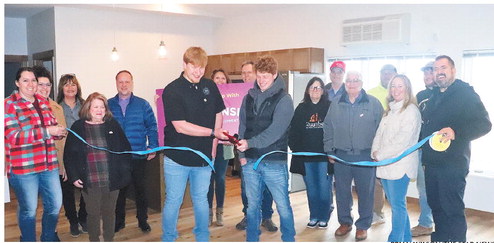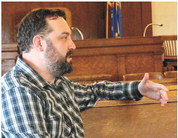County considers changes in committees, leadership


Changes could be coming to the Taylor County Board’s operational and committee structure.
Members of the county’s rules committee met Friday to review the current committee system and look at ways to improve it and involve more board members.
The bulk of decision making in county government occurs at the committee level with the committee members overseeing specific departments or areas of government such as human services, or forestry and recreation.
The long-established system has drawn criticism from board members who say it excludes those who are not on those committees from decisions with county-wide impact. There have been calls for more rotation among committee appointments and term limits for committee leadership. At the same time, the county is dealing with how to best manage day-to-day oversight of county departments and if this should be the role of committee chairs or a designated person such as an administrator or county executive.
Prior to last week’s meeting, county board members had been asked to give their input for any changes they would like to see happen. At the meeting, rules committee members reviewed that input. The plan is for the group to meet following the April 5 election to make recommendations for committee appointments for the reorganization meeting and for any changes to the county code.
Meeting length
Some county board members identifi ed meeting length as an issue with some meetings going on for hours. The suggestion was to limit meeting time to 90 minutes.
Committee chairman Lester Lewis disagreed with the need for set time limits, but said it was a good goal to have, noting that depending on the subject matter sometimes meetings will need to go on longer.
“It is up to the committee chairman to keep things moving,” said committee member Chuck Zenner. “We need to be considerate of people’s time.”
This is especially true for the members of the county board who need to take time off of work to attend committee meetings. Board member Mike Bub said that he is fortunate to have a job that is flexible, but it means that if he spends four hours in a day at county meetings, he will be making up that time that night. “Nobody sneaks in and does your work for you,” he said.
Bub suggested meetings could be shortened if they met more often as a county board. This would bring more things to the county board and allow for more input. It was noted that every committee is open to any board member who wants to attend.
Term limits
A proposal to limit the number of years county board members can serve on committees drew mixed responses.
Supervisor Diane Albrecht noted that having a long tenure on a committee gives the member greater understanding of the issues that are being talked about. She said she has served on the buildings and grounds committee for 25 years and that she felt it has been beneficial.
Lewis said that especially when it comes to smaller three-person committees the county could lose a lot of knowledge by rotating people off of committees.
“I don’t think term limits is the answer, I think change is the answer,” said committee member Scott Mildbrand supporting changes in leadership on committees.
According to Bub, there are people whose backgrounds lend themselves to being on certain committees. For example he spent a career working in information technology and currently heads up the county’s broadband committee. He said one of his concerns is that over a period of time, the committee chair’s relationship with the department head changes from being the overseer of the department to being a cheerleader for the department. “Some are more cheerleaders than overseers,” Bub said.
“A different perspective helps,” Bub said, explaining that the first few years on a committee people tend to be very critical in their thinking, and then after seeing it five or six times in the same budget they stop being as thorough as they might have been.
“You have seen it before, you get lackadaisical,” he said.
Concentration of power
Concerns were raised about the perception that the members of the finance and personnel committees have a concentration of power. Each of the committees has five members, but because county code sets the members of the personnel committee as being the chair of the finance committee and the chairs of the committee overseeing the largest county departments, there is overlap with a quorum of the finance committee serving on personnel.
County board chairman Jim Metz said finance is one of “the power committees” in the county and that in appointing members to it, he wanted to make sure that all areas of the county were being represented. He said they have members from the southern, western, eastern, northern and city of Medford who serve on the committee. He praised those serving on the committee for giving good representation.
Bub said the challenge is that on any issue those three who are also on personnel aren’t going to change their mind from one meeting to another and will get what they want passed. He said a solution to this would be to have more items come to the county board rather than having just three votes to pass them.
Lewis suggested combining the two committees to form one, seven-member committee as a way to include more people in the decision making.
Alternatively, Mildbrand suggested the possibility that if you serve on finance you shouldn’t serve on other committees. “That would be kind of the nuclear option,” he said.
Committee members shied away from that option and instead favored ideas from Lewis about expanding some committees to be five person and combining others.
While expanding some committees could lead to increased per diem costs, it was noted that in the total would not be a significant increase in overall county expenses.
“County board costs money,” Lewis said.
“The goal is to make good decisions for taxpayers,” Mildbrand said.
Administrative leadership
Committee members also had a discussion about the potential need for staff administrative leadership on a day-today basis.
Bub advocated for the county to have either a county administrator or county executive. The major difference between the two is that an administrator is hired while the county executive is elected. Bub noted that most counties in the state have one or the other, and said he favored an executive because they are elected by the people.
Regardless he said either would be at the courthouse to resolve issues before they get to the county board level.
Mildbrand was strongly opposed to having an administrator. “What are you going to do if you hire the wrong person,” he said, saying that it would be hiring “the king of the county” and would be putting another layer of bureaucracy between the workforce of Taylor County and the people.
Mildbrand also raised concern about the expense of hiring an administrator noting the salary would be $125,000 a year plus needing to hire an assistant for the position. He guessed it would be about a $200,000 a year cost projecting they would need a 2% tax increase just to pay for it.
Committee members took no formal action from the discussion, but set a meeting date for April 11. This is following the election and before the April 19 county board reorganization meeting where the committees will be voted on.





